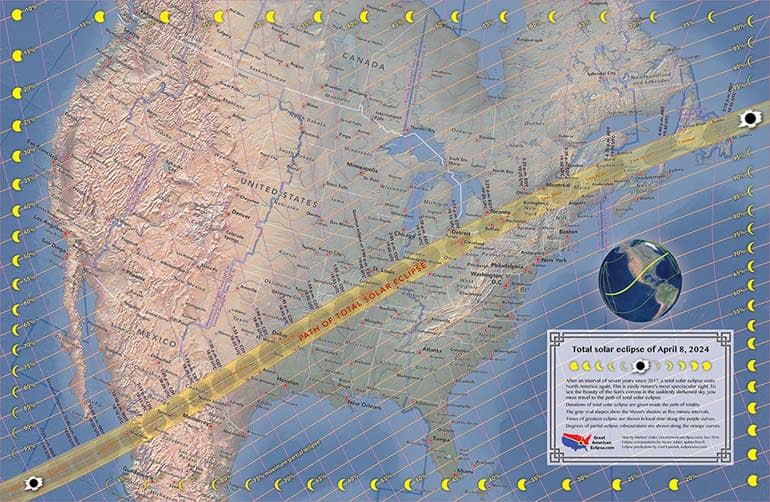Don't Worry If You Missed the Solar Eclipse
Consumer Reports has no financial relationship with advertisers on this site.
If you didn't watch Monday's total solar eclipse, don't worry. Another—supposedly better—one will be visible in the U.S. in 2024.
And if that's too long to wait, there will be three other total eclipses somewhere in the world over the next seven years.
So if you missed the one on Monday—or want to become a dedicated eclipse chaser—here's a guide to catch the next ones. (Also, check out these tips on photographing a solar eclipse.)
When—And Where—They Are
July 2, 2019: Viewable in South Pacific, Chile, and Argentina
The majority of the eclipse’s path will be over the Pacific Ocean, says Bill Kramer, a freelance computer programmer who runs Eclipse-Chasers.com, which organizes solar eclipse viewings.
For this event, Kramer says the best place to be is on a ship in the ocean. But for those who’d rather be on land, he says Argentina, specifically to the west of Buenos Aires, is where you’ll get the best views.
Keep in mind that July is winter in South America, so the weather may not be ideal.
December 14, 2020: Viewable in South Pacific, Chile, Argentina, and Antarctica
Since December is summertime south of the equator, this may be a better time to come than in July, writes Kramer on his website. “This is a modest eclipse of about two minutes in duration but it’s high in the sky for most of the landfall across the South American continent,” he says.
Another benefit of waiting until December, he says, is that the roads are generally snow-free and easier to use.
December 4, 2021: Viewable in Antarctica, South Africa, and the South Atlantic
Catching this eclipse is probably only feasible to the most adventurous and deep-pocketed travelers. The eclipse takes place in the southern polar regions, making landfall on Antarctica directly south of South America, according to Kramer.
While he says the best option would be to view this one from an aircraft, a more realistic option could be aboard a ship in the area. But even that may not be easy.
April 8, 2024: Viewable in Mexico, U.S., and Canada
For most people in the U.S., this is the next total eclipse we’ll be likely to witness. The sun will be completely blocked in 13 states: Texas, Oklahoma, Arkansas, Missouri, Illinois, Kentucky, Indiana, Ohio, Pennsylvania, New York, Vermont, New Hampshire, and Maine.
Because the eclipse takes place during a particularly rainy month in North America, Nowak says that you may want to arrange to view it from cities like Dallas; Hot Springs, Ark.; Indianapolis; or Cleveland. At least that way, if it rains, you’ll have other things to do.
To reduce the chances of a washout, Kramer says Mexico or Texas might be safer bets.
How to Get There
A number of tour operators offer solar eclipse packages. Check with a travel expert who specializes in solar eclipse viewing to make sure you go with a reputable company and that you get to the best areas.
Some eclipse tours include:
Tropical Sails Corp., based in Phoenix, which is offering the Solar Eclipse Tour 2019 in Chile: Alto Atacama Luxury Lodge, Santiago & La Serena.
You can also contact Eclipse Tours in Houston. While its tour for the Chilean eclipse is already sold out, it is organizing a tour for the 2020 eclipse in Argentina.
A third option is A Classic Tour, based in Redondo Beach, Calif., which also offers tours to Chile in 2019 and Argentina in 2020.
Airfares can book up quickly, but airlines don’t accept reservations until 11 months (330 days) in advance. So there's not much you can do right now.
And when it comes to booking a hotel, you usually have to wait until at least 18 months before you plan to check in, says Keith Nowak, a spokesman for online travel booking site Orbitz.com.
When you book a flight, it’s probably a good idea to arrive at least a day or two before the eclipse. It would be a shame to miss it because of a flight delay. Of course, booking early can result in problems too.
“The chances that the flight’s schedule will change increases, so keep an eye on that reservation to avoid an airport surprise,” Nowak warns.
Consider purchasing travel insurance in case any unforeseen events wreak havoc on your travel plans.
For More Information
There are many people who have dedicated themselves to eclipse chasing, and a Google search can become overwhelming really fast. To get information on talks, tours and to connect with astronomical enthusiast groups you can visit the American Astronomical Society and the National Science Foundation.
More from Consumer Reports:
Top pick tires for 2016
Best used cars for $25,000 and less
7 best mattresses for couples
Consumer Reports is an independent, nonprofit organization that works side by side with consumers to create a fairer, safer, and healthier world. CR does not endorse products or services, and does not accept advertising. Copyright © 2017, Consumer Reports, Inc.


